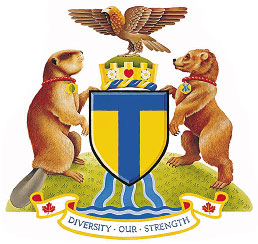Toronto: Difference between revisions
(→Quote) |
|||
| Line 16: | Line 16: | ||
== '''Climate''' == | == '''Climate''' == | ||
Toronto has a humid continental climate, with warm, humid summers and cold winters. The city experiences four distinct seasons, with considerable variance in day to day temperature, particularly during the colder weather season. Owing to urbanization and its proximity to water, Toronto has a fairly low diurnal temperature range (day-night temperature difference). The denser urban scape makes for warmer nights year around and is not as cold throughout the winter as surrounding areas (particularly north of the city); however, it can be noticeably cooler on many spring and early summer afternoons under the influence of a lake breeze. Other low-scale maritime effects on the climate include lake-effect snow, fog and delaying of spring- and fall-like conditions, known as seasonal lag. | |||
Toronto winters sometimes feature cold snaps where maximum temperatures remain below −10 °C (14 °F), often made to feel colder by wind chill. Snowstorms, sometimes mixed with ice and rain, can disrupt work and travel schedules, accumulating snow can fall any time from November until mid-April. However, mild stretches also occur in most winters melting accumulated snow. The summer months are characterized by long stretches of humid weather. Usually in the range from 23 to 31 °C (73 to 88 °F), daytime temperatures occasionally surpass 35 °C (95 °F) accompanied by high humidity making it feel oppressive during these brief periods of hot weather. Spring and autumn are transitional seasons with generally mild or cool temperatures with alternating dry and wet periods. | |||
Precipitation is fairly evenly distributed throughout the year, but summer is usually the wettest season, the bulk falling during thunderstorms. There can be periods of dry weather, but drought-like conditions are rare. The average yearly precipitation is about 831 mm (32.7 in), with an average annual snowfall of about 122 cm (48 in). Toronto experiences an average of 2,066 sunshine hours, or 45% of daylight hours, varying between a low of 28% in December to 60% in July. | |||
== '''Districts''' == | == '''Districts''' == | ||
Revision as of 20:06, 18 April 2015
Quote
"Toronto's already ass-deep in cockroaches and conservatives; what's one more lower life-form?" -― Tanya Huff, Blood Bank
"If you can get with the freaks, then we want you here." -― Sarah Liss, Army of Lovers
"We are a city of charming little parkettes, she thinks grimly, that nobody ever visits. Named for local heroes that nobody remembers." -― K. D. Miller, All Saints
Appearance
City Device
Climate
Toronto has a humid continental climate, with warm, humid summers and cold winters. The city experiences four distinct seasons, with considerable variance in day to day temperature, particularly during the colder weather season. Owing to urbanization and its proximity to water, Toronto has a fairly low diurnal temperature range (day-night temperature difference). The denser urban scape makes for warmer nights year around and is not as cold throughout the winter as surrounding areas (particularly north of the city); however, it can be noticeably cooler on many spring and early summer afternoons under the influence of a lake breeze. Other low-scale maritime effects on the climate include lake-effect snow, fog and delaying of spring- and fall-like conditions, known as seasonal lag.
Toronto winters sometimes feature cold snaps where maximum temperatures remain below −10 °C (14 °F), often made to feel colder by wind chill. Snowstorms, sometimes mixed with ice and rain, can disrupt work and travel schedules, accumulating snow can fall any time from November until mid-April. However, mild stretches also occur in most winters melting accumulated snow. The summer months are characterized by long stretches of humid weather. Usually in the range from 23 to 31 °C (73 to 88 °F), daytime temperatures occasionally surpass 35 °C (95 °F) accompanied by high humidity making it feel oppressive during these brief periods of hot weather. Spring and autumn are transitional seasons with generally mild or cool temperatures with alternating dry and wet periods.
Precipitation is fairly evenly distributed throughout the year, but summer is usually the wettest season, the bulk falling during thunderstorms. There can be periods of dry weather, but drought-like conditions are rare. The average yearly precipitation is about 831 mm (32.7 in), with an average annual snowfall of about 122 cm (48 in). Toronto experiences an average of 2,066 sunshine hours, or 45% of daylight hours, varying between a low of 28% in December to 60% in July.
Districts
Demonym
Economy
Geography
History
Population
- -- City (2,615,060) - 2011 census
- -- Urban (5,132,794) - 2011 census
- -- Metro Area (5,583,064) - 2011 census
Arenas
Attractions
Bars and Clubs
Cemeteries
City Government
Crime
Citizens of the City
Current Events
Fortifications
Galleries
Holy Ground
Hospitals
Hotels & Hostels
Landmarks
Maps
Mass Media
Monuments
Museums
Parks
Private Residences
Restaurants
Ruins
Schools
Shopping
Telecommunications
Theaters
Transportation
Vampires of Toronto
- -- The Orange Men -- A Black Hand Nomadic Pack originally from Montreal
- -- Lords of Violence --
- -- Hogtown Super-Soldiers -- The Sabbat's only permanent Gray-Cup Football team.

